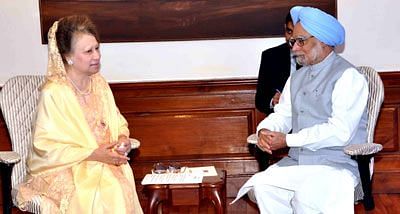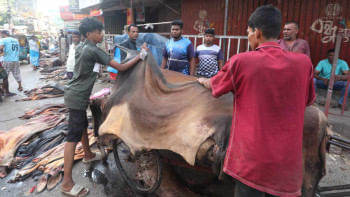Khaleda Zia tempting history?

Photo: STAR
Khaleda Zia, the leader of the opposition, is in Delhi on an official visit. She was invited by the government of India and accorded a red carpet welcome. Besides calling on the Indian Prime Minister Manmohan Singh and having lunch with him, she was also hosted by the leader of the Indian opposition Ms. Shushma Swaraj of BJP.
Khaleda Zia's official host, the newly appointed Indian Minister for External Affairs, Mr.Salman Khurshid, also held substantive discussion at Hyderbad House, which is usually the venue for receiving visiting heads of government. Her tour ends with meeting Sonia Gandhi, the head of the ruling Congress Party, and President Pranab Mukherjee.
The last time Khaleda went to India was in 2006 when she was the prime minister. The outcome of the talks with the leaders then was inconsequential. It was reported that the Indians found it difficult to do business with her. She referred to many of the unresolved bilateral issues and the fact that India had consistently failed to honour its commitments made to Bangladesh, both in letter and in spirit. At that time bilateral trade and the high tariff barriers in India, the unresolved issue of sharing of the waters of the common rivers, and the matter of demarcation of land borders were high on her agenda.
India was of course concerned about Bangladesh "allowing the use of its territory to some of the insurgents" from the north-eastern states of India, causing serious security problems. India was also keen to have transit rights from Bangladesh to connect these north-eastern states with mainland India. But then it seemed that any cooperation with India was not in Khaleda Zia's immediate agenda. The outcome was a stalemate in bilateral relations.
When Awami League swept into power in the 2008 general elections, one of the priority tasks of Prime Minister Shiekh Hasina was to travel to New Delhi and meet Prime Minister Manmohan Singh and extend a warm hand of friendship. Both sides then sat down and pledged much to do for each other. A new era of friendship seemed to have begun. It is four years now, but much of what has been pledged by India is yet to see the light of day. Bangladesh, at its own initiative, had promised to bring the insurgents creating security problem in north-east of India to task. It also promised not to allow Bangladesh soil to be used for insurgency against the central government of India. In fact, Bangladesh incarcerated some top insurgent leaders who were then handed over to the Indian authorities.
While Bangladesh was sincere in carrying out its commitments, India responded with little else than assurances. It had pledged to exchange the enclaves and the adversely possessed territories, and to finalise the demarcation of the land boundary. But all this was held up at India's end due to legal and parliamentary obstacles. Even the eagerly awaited agreement for equitable sharing of the waters of the Teesta river could not be initialed as the chief minister of West Bengal took umbrage that she was not consulted before the event.
So all went up in smoke. Only the matter of disbursement of a $1billion Indian credit was taken up in right earnest. This was mainly to buy Indian rolling stock to ease the movement of Indian goods through Bangladesh if the issue of transit was finally agreed upon by Bangladesh. The other project that India pursued diligently was to connect India with Bangladesh through a grid in order to sell electricity. To many in India this narrative may sound like the usual litany of complaints by Bangladesh. But can anyone overlook the reality?
Now that Khaleda Zia and her party have a fair chance of capturing power in the next elections, India perhaps thinks that a less adversarial BNP could be to its advantage. All the security advantage that the Awami League provided should not be reversed in case the BNP returns to power. Hence, the invitation and all the bonhomie. Khaleda Zia, by committing herself publicly to a new era of friendship with India, also has an eye on her own electability. She would not like to give voters any excuse that could upset her chance to return to power. Her party has therefore urged all Bangladeshis skeptical of Indian intentions not to look at the rearview mirror.
However, Khaleda Zia may also have reasons to be optimistic regarding future India-Bangladesh relations. She is a no-nonsense politician. The changing geo-politics of the region and the dictates of losing economic opportunities that can come through sub-regional cooperation could have finally dawned on her. After all, it was her late husband President Zia, the founder of BNP, who had initiated the idea of regional cooperation by proposing Saarc. But has BNP calculated the political cost if this policy of embracing India backfires?
No one will be more pleased than the people of Bangladesh if the two countries sincerely work to resolve the outstanding bilateral issues. The next stage would be that the leaders start sharing a common vision of building a prosperous region. Khaleda Zia has already mooted the idea that India could join a consortium with China to build a deep-sea port in Bangladesh. This is well and good. In many ways the Awami League had also encouraged such process and had shared some visions with India. But then what happened?
The question that beggars an answer is, what has changed so dramatically that we can expect India to work towards our mutual good? To be honest, nothing substantive has led to this fresh dynamics. The Indian Congress is just keen to ensure that Khaleda Zia is not adversarial if BNP returns to power. So, by all measures, it could be just a confluence of interest that has Congress and the BNP playing the same tune.
If BNP now thinks that a fresh look at India is imperative, it may be a little early in the day. General elections in India in 2014 could change yet again the parameters on which BNP is now crafting its policy towards India.
But in any case, Khaleda Zia has made a good start. At least the people of Bangladesh can rest knowing that both the major parties here do not have an anti-India agenda. The ball is definitely now in India's court. It has to play the cards well so that whichever political party wins the next elections in Bangladesh it can ensure that relations are built on solid foundations and can stand the test of time. The acid test would be how soon India can redeem the pledges made to Bangladesh and deliver them.
But India and BNP must understand that both are challenging history. The way forward could still be a bed of thorns if either country reneges on its pledges.

 For all latest news, follow The Daily Star's Google News channel.
For all latest news, follow The Daily Star's Google News channel. 



Comments